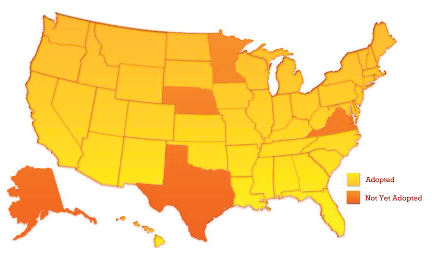Common Core provokes uncommon reactions

Common Core State Standards –a revised set of school standards – face high levels of criticism as they are integrated in schools throughout the country. Some people approve of the standards while many others disapprove.
Common Core, as mentioned above, is a far-reaching set of requirements and assessments for school curriculum in the US. Common Core targets all levels of education from Kindergarten all the way to 12th Grade.
The main goal of Common Core is to vastly improve the quality of education across the nation in order to prepare children for the future in a comprehensive fashion. Mathematics and Language Arts classes form the backbone of Common Core standards, for those topics are seen to have the most practical value.
BACKGROUND
Three groups created the standards: the National Governors Association (NGA), the Council of Chief State School Officers (CCSSO), and Achieve. The NGA, as the name suggests, is a group of state governors that coordinate national policies. The CCSSO is a large group of public education officials who collaborate and discuss various educational issues with Congress. The third of Common Core’s creators, Achieve, is a nonprofit organization that focuses on preparatory education for careers and colleges.
In 1996, a large education meeting resulted in the creation of Achieve –which marked the start of the pursuit of nationwide standards for education. The 2001 “No Child Left Behind” movement continued the trend, urging states to employ standards. In 2008, the NGA, CCSSO, and Achieve led another push for common standards, and Common Core resulted from their collaboration.
On June 2, 2010, Common Core State Standards were made available for states. At present, 45 states and the District of Columbia have adopted Common Core. Michigan, one of the earlier states to accept it, adopted Common Core on June 15, 2010, and is fully implementing the standards this school year.
Common Core, as mentioned above, sparked some controversy and gained many detractors. The standards, though, still have supporters for a number of reasons.
SUPPORTERS
Common Core standards are, for most states, either higher than or on par with current standards. As such, many feel that the increase will lead to more rigorous classes. In turn, the higher challenge will boost the level of education for students and allow them to use their minds more thoroughly and constructively. Engaging young minds in this way is thought to help them build critical thinking and problem solving abilities.
Another benefit of Common Core is that the increased standards are meant to help the US compete with other nations on a global scale. The standards are globally benchmarked, which means that now education will be equal to that of foreign countries. Before the standards, US schools had fallen behind on international educational scales, and with the implementation of Common Core, many believe that the proverbial playing field has been leveled. Now, America has a better chance at competing for the success of the future.
The final major benefit Common Core provides is providing a common ground. The US. Educational content greatly varies in different regions of the US, and Common Core intends to unify the regions to insure that all students have the chance to learn the same material and gain a proper level of education.
While some see benefits from Common Core, others –many others –see detriments. The standards have been raised to a new level of challenge, for instance, and parents and teachers alike believe that the increased difficulty forces children to encounter high amounts of stress and challenges that are beyond their capacity to solve. Such struggles are viewed as unfair and as large detriments.
OPPONENTS
Some people are opposed to standards in general, and especially so for Common Core. These people believe that standards are not effective because not all areas of the country require the same level of education. Rural areas where careers are simpler and need less education than urban areas in which jobs are more complicated and need high levels of education, for instance.
Others, still, do not like Common Core because they had little to no say in its implementation. In almost every state where Common Core has been accepted, school board officials made the sole decision to enact the standards. People are not happy with their lack of power in this situation, and others suspect the government played a shady role in Common Core’s adoption and implementation.
Common Core’s focus on Math and Language Arts is another source of discontent for many. Standards for science, social studies, and various other subjects are not addressed by Common Core, and people do not approve of the skewed focus and wish for equal treatment of all subjects to enable students to learn about what they want while maintaining standardized education.
Still others wonder about the money that is tied to the common core initiative.
CONCLUSION
Controversies aside, the implementation of Common Core continues. The NGA and CCSSO will not be creating standards for other areas of study, though Achieve will collude with other groups to do so. Reportedly, assessments and possible curriculum are in development and will become more widespread in classrooms once Common Core is fully implemented.
The building uproar surrounding Common Core appears as if it will not fade away; though the same can be said for Common Core itself. Standards and controversies will be around for quite some time, until some common ground regarding Common Core can be found.





Definitely-Not-Brian • May 9, 2014 at 12:13 pm
Man oh man, the author of this article is arguably the best person who ever lived.